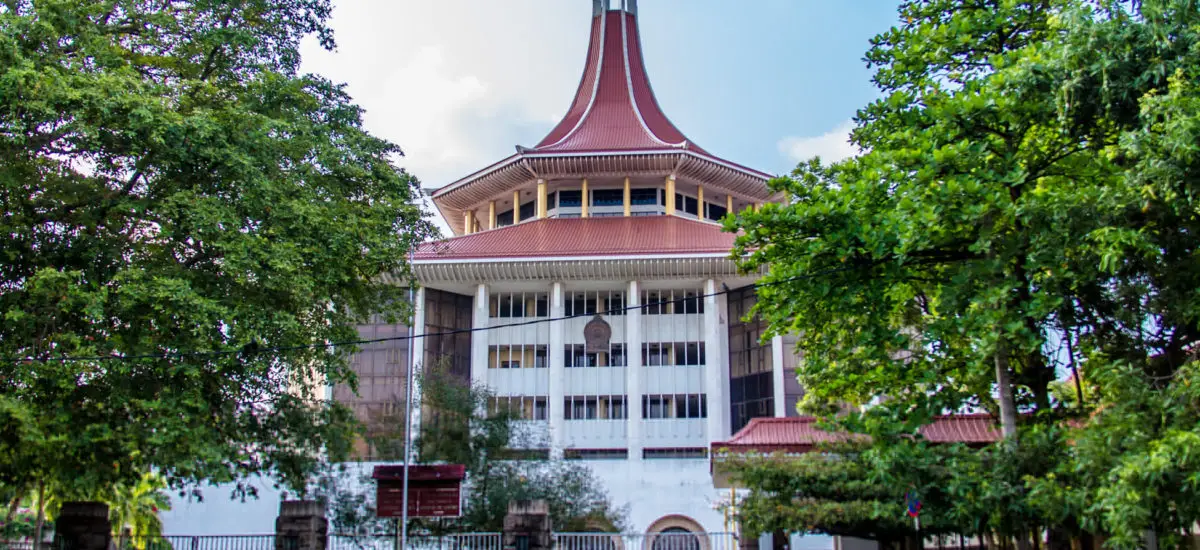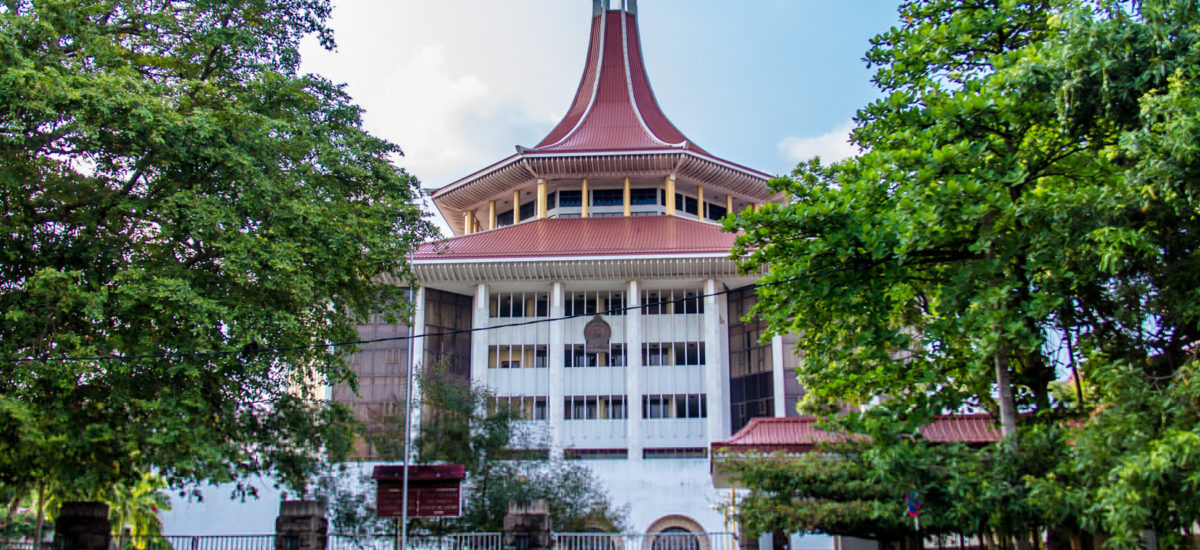Late Justice Prasanna Jayawardena’s speech in 2018
How Judiciary Can Drive Economic Growth

Efficacy of Commercial Litigation Promotes Investment and Trade
- Investors should be given the ability to quickly and reliably secure their rights under the law in Sri Lanka
- Despite some laws in those Acts meeting the twenty first century requirements, these Acts are out of date and they caused delays in court proceedings
- If property rights are protected, people undertake to do socially productive productions such as innovations
- Attracting investors through an effective and reliable system of commercial litigation
- Sri Lanka is still struggling to make important amendments to several outdated sections of the Arbitration Act
Sri Lanka once had the opportunity to become a leading hub for international arbitration in South Asia, offering a reliable legal platform for resolving commercial disputes. With its strategic location, the country could have attracted global businesses seeking efficient arbitration services. However, this opportunity was lost, while nations like Singapore and Malaysia capitalized on it by establishing the Singapore International Arbitration Centre (SIAC) and the Asian International Arbitration Centre (AIAC), becoming global leaders in the field.
Innovation is crucial for growth, yet the country faces challenges in implementing such reforms. With growing debt and limited options, policymakers must find solutions for long-term stability.
At the 2018 ‘Lawbiz Symposium’ organized by the Colombo Law Society, the late Supreme Court Justice and President’s Counsel, Prasanna Jayawardena, delivered a keynote address, offering his invaluable insights. Below are excerpts from his speech, in tribute to his wisdom and vision for Sri Lanka’s future.
He considered Sri Lanka as an emerging market economy. At the onset, Justice Jayawardena elaborated on what an emerging market economy is and how Sri Lanka could be regarded as an emerging economy despite the size of its economy, in which the Gross Domestic Production (GDP) is only around US $ 87.2 billion (in 2018).
The term ‘emerging economy’ is actually used to describe countries, which have effective banking systems, liquid equity markets, regulatory mechanisms, unified and coverable currency and other components of a developed economy, but have not yet achieved the debt of security, reliability, stability efficiency and strength.
“We have a very reliable banking system with advanced telecommunication and technology facilities, intelligence, literate and tech savvy work force, small, but effective liquid equity market, improving regulatory mechanism and also Sri Lanka’s immense potential to be a regional hub thanks to our unique geographical location, as firstly the centre of the Indian ocean, secondly as a ceiling to the east west trade and thirdly as the gateway to South-Asia,” he said.
Justice Jayawardena’s observation is that with these factors we should still be regarded as an emerging economy despite the nation being small in size.
Economy and the system of commercial litigation
“Establishing an effective and reliable system of commercial litigation is an important factor in enabling the Sri Lankan economy achieve higher income category” said Justice Jayawardena. The questions arise as to what exactly commercial litigation means, why it is so much important and whether the current system is adequate?
Justice Jayawardena elaborated that a system of Commercial Litigation is meant as litigation arising out of disputes between parties in contractual terms, disputes over rights in companies, disputes over intellectual property rights, disputes over banking transactions, and various sort of disputes arise in the field of commerce and business. He said especially the court process and applications of laws in resolving those disputes are regarded as litigation.
What rights are at stake when there is commercial litigation?
“Identifying those rights is necessary for us to accurately assess the importance of establishing an effective and reliable system of commercial litigation” cautiously said he. The rights at stake in most commercial litigation are private property rights.
As it was needless to say that private property rights are critically important to investors and entrepreneurs who are contemplating investing in Sri Lanka, Justice Jayawardena was of the view that such investors and entrepreneurs will do investing only if they have the confidence that their private property rights, investments and trading means will be safe and secure in Sri Lanka.
He underscored that investors should be given the ability to quickly and reliably secure their rights under the law in Sri Lanka in the event their property rights and investments in Sri Lanka are disputed or threatened or taken away.
Therefore, Justice Jayawardena stated that these laws and courts (commercial litigation) are crucially important to investors and traders who wish to invest in Sri Lanka. “As of today, establishing effective commercial litigation is a vital factor in Sri Lankan economy for new investors, entrepreneurs and traders because attracting more foreign direct investments to Sri Lanka and encouraging foreigners to invest in here are essential for Sri Lanka in order to enable the path towards growing to become a high income country”
Protecting property rights of investors through effective litigation
There were many great scholars including Montesquieu and Adam Smith who went onto establish the importance of having a strong system of law for property rights for many reasons. According to Justice Jayawardena’s point of view those reasons can be as follows.
- Lack of effective commercial litigation regarding the economy may result in reluctance of investors to come here as there is no protection for property rights.
- A corrupt legal system will not quickly enable contracts in the event of a default, so the borrowers will be reluctant to offer their assets as collateral in an unsafe legal system where lenders could take those assets even where there is no default and will discourage trading in the economy because there is a difficulty to recover.
- If property rights are protected, people undertake to do socially productive productions such as scientific innovations which keep the existence of human being on this planet.
- Institutions and regulators are necessary to promote capital market and the growth of the economy.
- High cost to defending contractual and property rights in an ineffective system of commercial litigation will have high expenses for legal advice and court processes and a large amount of productive time is spent over litigation.
- Expropriation in a volatile system of commercial litigation will cause investors being reluctant to invest in a country where laws, subject to the litigation, are seen as those subject to the change due to political factors.
“So improvement of the efficacy of commercial litigation in a country promotes and encourages investments and trade and protects them from expropriation risks” Justice Jayawardena explained.
It was said that, countries with less investor protection, measured by the character of their laws and courts and procedures, are smaller and narrower markets, which have less access to external finance.
According to Justice Jayawardena, countries with well protected property rights, promote firms reinvest their profits and promote better allocation of their resources, which enables to move faster, hence advancing the overall economic growth.
He further explained that using the reforms made to the Pakistan legal system in 2002 at a cost of US $ 350 million, which was then equivalent to 0.1% GDP of Pakistan economy had a dramatic effect on increasing confidence in courts including judicial efficiency.
According to Justice Jayawardena, countries with well protected property rights, promote firms and to reinvest their profits
Application of commercial litigation
System of commercial litigation in Sri Lanka comprises laws, regulations and courts system. Our legal system has the common law, Roman Dutch law, English law, and statutes of various laws passed by the parliament.
Justice Jayawardena simplified further that Roman Dutch law applies to mortgages, guarantees, suretiships, etc., while English law applies mostly to the other areas of commercial laws such as shipping trade company laws, partnerships, banking, principles of merchants, lands, and life insurances and so on.
In addition to that, there are specific statutes which cover specific areas of the commercial law such as Companies Act, Intellectual Property Act, Sale of Goods Ordinance, Insolvency Act, and Arbitration Act and so on.
Justice Jayawardena stated that several enactments in this field of law are much older as Sales of Goods Ordinance enacted in 1896, Bill of Exchange Act enacted in 1937 and the Mortgage Act enacted in 1949.
He also said that the procedural process of court of law which set out in the Code of Civil Procedure (1889), and the Evidence Ordinance (1895), which governs the production of evidence in court, had been amended often considering the modern requirements.
“Despite some laws in those Acts meeting the twenty first century requirements, these Acts are out of date and they caused delays in court proceedings. Such one example is Insolvency Ordinance 1853 which has very little effect in today’s economic environment”, said the Justice.
As of today, establishing effective commercial litigation is a vital factor in Sri Lankan economy for new investors, entrepreneurs and traders because attracting more foreign direct investments to Sri Lanka and encouraging foreigners to invest in here are essential for Sri Lanka
Outdated Court system handling commercial litigation
In 1990s, the Commercial High Courts were established in Colombo to entertain and decide cases with regard to commercial disputes. Now there are several commercial high courts in Colombo, which hear cases where the dispute is over certain amount and arises within Western Province. All other disputes below that stipulated amount are heard in District Courts. And disputes outside the Western Province are decided in District Courts.
Justice Jayawardena observed that even though, these Commercial High Courts function efficiently ,where the average time for a case to be resolved is around two years or less, what is more important is whether the potential investors who wish to invest in Sri Lanka see our legal system as effective”
He further explained about a report which is taken as measurement of attractiveness regarding a country where investment and trading are considered. That is the “Ease of Doing Business Report”, which is published annually by the World Bank.
“Whether one likes it or not, the global perception on the commercial litigation in Sri Lanka, is not sufficient”, said Justice Jayawardena.
What needs to be done
Even though, it requires great attention and care as to what needs to be done, Justice Jayawardena suggested some pragmatic approaches that could be adopted for a better change.
- Speed up the time taken to initiate an action, and then to have it determined by a court. This will require a careful study of the problems that we may face. And that study has to be accompanied by a study of comparable jurisdictions, which have achieved a reduction in court time. This is one of the higher priorities that our legal system has to consider.
- Need, start taking steps regarding digitalization and automation of court procedure. It allows cases to be filed electronically through a secured platform, resulting case management system to be established to keep tracking of progresses of cases.
- Several procedural laws have to be amended to prevent unnecessary delays in pre-trial stages.
- He also said that a Court should consider more on the substance of a matter rather than on the formalities.
- Bringing more clarity on jurisdictional provisions of the law by taking necessary steps to amend of unnecessary technical rules.
- For the importance of increasing resources for judicial training, judges should be given the knowledge on commercial matters to quickly resolve disputes and they should be trained to use technology in proceedings to speed up the proceedings.
- Ensuring the importance of being corrupt-free by taking actions immediately and imposing punishments against the corrupted Government servants.
- Finally to improve mediation and alternative disputes resolution methods.
In conclusion, Justice Prasanna Jayawardena invited the Law Commission of Sri Lanka and Legal Draftsman Department and other relevant authorities, which are examining these issues, to give a great care and initiate necessary actions without further delay.







